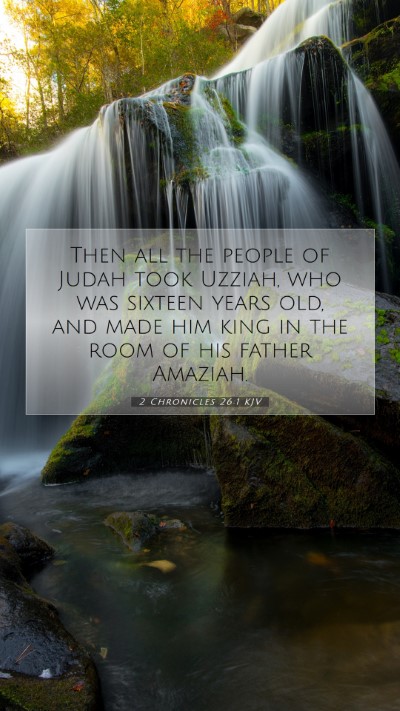Understanding 2 Chronicles 26:1
Bible Verse: 2 Chronicles 26:1 – "Then all the people of Judah took Uzziah, who was sixteen years old, and made him king in the room of his father Amaziah."
Overview
This verse marks the ascension of Uzziah to the throne of Judah at a young age, following the reign of his father Amaziah. The significance of appointing a young king speaks volumes about the dynamics of leadership and the context of the nation of Judah at that time.
Historical Context
This verse occurs in a time of political instability and transition within Judah. Amaziah, Uzziah's father, had a tumultuous reign, and the choice of a new leader may reflect the people's desire for stability and hope for rejuvenated leadership.
Bible Verse Meanings and Interpretations
The unity of the people in choosing Uzziah indicates a collective hope and trust in the youth. Commentators offer various insights on this:
- Matthew Henry: He emphasizes the remarkable nature of young Uzziah's rise to power. Despite his youth, this act suggests that God can use anyone to fulfill His purposes, and the people's choice reflects a desire for a change in leadership.
- Albert Barnes: He interprets the appointment as not merely a political move but a divine orchestration, highlighting God's sovereignty in the selection of leaders. Barnes points to the blessings associated with Uzziah's reign later in his life.
- Adam Clarke: Clarke elaborates on the implications of a young king, suggesting it symbolizes new beginnings and a fresh perspective in governance. He discusses the impact of Uzziah's reign on Judah, foreshadowing both promise and peril.
Bible Verse Explanations and Insights
The explanations of this verse encompass broader theological themes:
- The age of the king symbolizes a potential for innovation and change.
- The people's role in elevating Uzziah reflects democratic elements in the governance of ancient Judah.
- Uzziah's story serves as a cautionary tale about the responsibilities of leadership and the consequences of pride as detailed in subsequent verses.
Overall, this verse initiates a narrative that examines leadership's complexities, the relationship between rulers and the ruled, and God's omnipresence in guiding historical events.
Application of This Verse
For contemporary readers, this verse encourages reflection on the qualities of leadership and the importance of making wise choices in governance, both in personal circumstances and within communities.
Related Scripture and Cross References
To further explore themes related to 2 Chronicles 26:1, consider the following cross-references:
- 2 Kings 14:21-22 – Discusses Amaziah's reign and its implications.
- Isaiah 6:1 – Uzziah's reign ended with his leprosy, leading to significant changes in leadership.
- 2 Chronicles 25:27 – The account of Amaziah's death provides context for Uzziah’s rise.
Culminating Thoughts
Understanding 2 Chronicles 26:1 requires a blend of historical context and theological insight. It prompts readers to consider how situations of power and authority are shaped not just by individuals but by the communities that establish them.
Conclusion: Importance of Bible Verse Commentaries
Engaging with Bible verse commentaries enhances our bible study understanding and provides depth to bible verse explanations. By analyzing various perspectives from scholars like Matthew Henry, Albert Barnes, and Adam Clarke, we can gain a more robust grasp of Scripture, leading to rich discussions in bible study groups or individual studies. This verse, like many, is more than just a historical record; it resounds with the weight of application, inviting us to consider how we, too, navigate the complexities of leadership and community.


